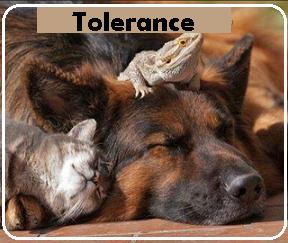The New Tolerance vs. Christian Convictions
The New Tolerance vs. Christian Convictions
For most of my life, I thought I knew what people meant when they used the word "tolerance." But I have discovered that what the word once meant and what it means today are two drastically different things. The new meaning, which I'll refer to as the "new tolerance," stretches far beyond the dictionary's definition of the word. This new meaning is enjoying widespread acceptance throughout our culture, and the implication for your Christian faith, and for the faith of our Christian youth in particular, is alarming.

Webster's defines the word "tolerate" as follows:
to recognize and respect (others' beliefs, practices, etc.) without sharing them and to bear or put up with (someone or something not especially liked).1
This traditional definition is perfectly compatible with Scripture. In fact, the Bible says we are to "accept one another, then, just as Christ accepted you, in order to .bring praise to God" (Romans 15:17, NW). This is the same attitude that Paul expressed in his first epistle to the Corinthian church when he explained that love "endureth all things" (13:7, KJV). This type of tolerance differentiates between a person's thoughts or actions and the person himself. Unfortunately, the dictionary definitions of tolerance no longer capture the full meaning promoted by the "new tolerance;" at least not according to the majority of people and institutions using the term. And this is increasingly true among younger generations.
I would estimate that approximately 80 percent of the time that the word "tolerance" is used today – by teachers, the media, government officials, and perhaps even your own children – it is being used to mean the "new tolerance," which says that what every individual believes or says is equally right and equally valid. In other words, all values, beliefs, lifestyles, and truth claims are equal.
G. K. Chesterton, the English author who strongly influenced the life and writing of C.S. Lewis, once said, "Tolerance is a virtue of a man without convictions." This statement alludes to one of the dire consequence of the new tolerance: the loss of conviction. In order for a person to possess convictions about a belief, it is necessary, by definition, for the person to be convinced that his or her belief is true. But if I sincerely consider everyone's beliefs, lifestyles, and truth claims as equal to my own (even when they contradict my beliefs, lifestyles, and truth claims), I can no longer claim any genuine conviction regarding my own beliefs. The new tolerance requires me to admit that I may just as easily be as mistaken or misled as my neighbor. If no truth is "more true" than any other "truth," then there is no truth worth defending. And if there is no truth worth defending, there is no room for conviction.
This is why it is so important for parents, teachers, and youth workers to pass on to our children what we as Christians believe to be absolutely true – that Jesus Christ is who He claimed to be: the way, the truth, and the life. But how do we know that? How can we be sure whose view of God and whose claims about truth are right? What is the basis of these convictions we are passing on to our children?
When faced with competing truth claims, the only way to arrive at a meaningful conclusion is by investigation. The careful observer must weigh the claims according to the evidence. If someone claims that something is true, we should be able to "test" that claim to determine if it is based on fact.
The only way to determine God's true identity is through open-minded consideration of the evidence. Christianity does not revolve around a list of spiritual exercises and practices, but around a core of verifiable, historical facts about a person and his claims to be God. Jesus Himself appealed to people's reason and the evidence of His deity. "Don't you believe that I am in the Father and the Father is in me?" He asked. "Or at least believe because of what you have seen me do" (John 14:10-11). Christ wanted His followers to believe in Him for whom He claimed to be, so He appealed to the evidence that established that He was, in fact, the Son of the one true God. The evidence was and is there to convince our minds that Christ's claims are objectively true.

We want our kids to have solid convictions that will enable them to stand strong in today's culture, but it is vitally important that we help them to build those convictions on objective truth. If our youth are to come to any meaningful conclusions about right and wrong, good and evil, we must – now more than ever help them to examine the evidences for the reliability of the Bible and the veracity of its claims about Christ's being the Son of the one true God.

Add new comment